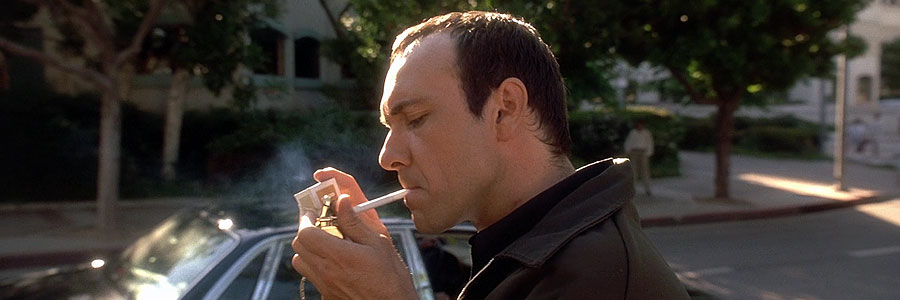
The Usual Suspects
MGM
Original release: August 16th, 1995
Running time: 106 minutes
Director: Bryan Singer
Writer: Christopher McQuarrie
Cast: Kevin Spacey, Gabriel Byrne, Chazz Palminteri, Pete Postlethwaite
Keyser Söze: 01:37:00 to 01:42:00
Deconstructing Cinema: One Scene At A Time, the complete series so far
The Usual Suspects is one of my favourite films for the reason that first time round the end is a shock, and then with the second viewing you have the pleasure of trying to piece 99% of the story together.
It builds a story that’s shattered in the last 5 minutes and it has real undertones of deconstructionism that hit home on repeat viewings. I see this as a classic untrustworthy narrator story that doesn’t become apparent until the end, and that’s why it has genuine merit for me.
The story is told through a series of flashbacks with a voiceover from an extended interview with the walking paradox that is Roger “Verbal” Kint (Kevin Spacey).
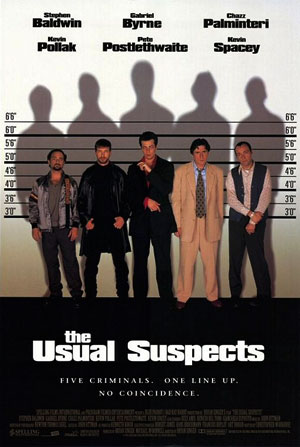
Roger Kint is a naive, loveable buffoon with cerebral palsy who talks far too much, hence the nickname Verbal. He becomes this living contradiction by the fact that he has such a seemingly soft nature despite being an experienced, hardened criminal. His gentle voice guides interviewer special agent David Kujan (Chazz Palminteri) through the series of events that resulted in Verbal being one of two survivors of a massacre on a boat in San Pedro Bay.
Through his narrative we meet a collection of criminals he worked with and for, including the infamous Keyser Söze: the vicious criminal who became a “spook story criminals tell their kids at night”.
What I love about this film is that it’s not a ‘who-dunnit?’ crime film, or an Oceans 11 with the charming gang of high class thieves, it’s just a collection of criminals and an interesting story. Keaton (Gabriel Byrne) is at the top of the pyramid trying to go straight and turn away from his life of crime, but his former colleagues and the police department either believe he hasn’t gone straight or want him to go back to crime.
All of the other low-life criminals beneath Keaton accept where they are and go about their business. This rag-tag group rope him in and he gets involved with a few small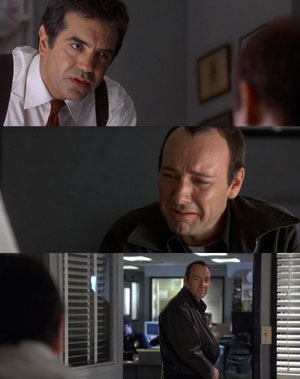 time crimes until they meet Mr Kobayashi (Pete Postlethwaite), Keyser Söze’s assistant.
time crimes until they meet Mr Kobayashi (Pete Postlethwaite), Keyser Söze’s assistant.
Keyser Söze figures a bizarre kind of justice; they have all stolen from him without knowing it over the years, and now this figure of infinite power and strength demands something in return. All of their crimes have come back to haunt them, but to save themselves they have to fall further into that rabbit hole of criminal activity. The more they pull away the quicker they realise the extent of Söze’s control – so they agree to do his bidding in an attempt to balance the scales of honour among thieves. Mr Kobayashi tells them:
It all builds up to the crescendo of The Usual Suspects which reflects how unconventional the film really is. Verbal’s narrative ends and he walks out of the police station, but that’s not the end of the story, not by a long shot.
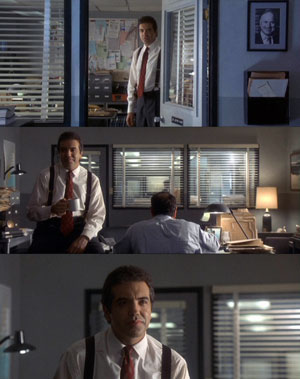
For the first time in the film there is a glimpse of pure normality. Kujan finally relaxes, safe in the knowledge that he’s done his best he starts to shoot the breeze about the dirty office. He smiles and makes jokes and sips from his coffee and quietly comments:
For the first time we see Kujan smile and it’s unsettling in a way. This moment of calm is when the real police work is done – when all the pieces make the wider puzzle; the random embellishments in his story, all of the little details, are visible in plain sight on the notice board Verbal has been facing for his entire interview.
Kujan and everyone else have been made fools of, and there’s a moment of realisation of the gravity of this evidence. Before Kujan was focusing on how Keaton was involved in this whole mess, but then in a moment his attention goes to Söze.
Who is Keyser Söze? It becomes apparent when we see Verbal walking away.
The style of this scene is brilliant. It’s so well crafted. There’s such a change of pace, it feels so much like a standard unresolved ending that could easily fade out to black in a film noir-style with the two policeman at the desk – but The Usual Suspects is smarter than that.
At the moment of realisation Kujan drops his mug and it shatters from several different angles, while snippets of dialogue from the interview are replayed. 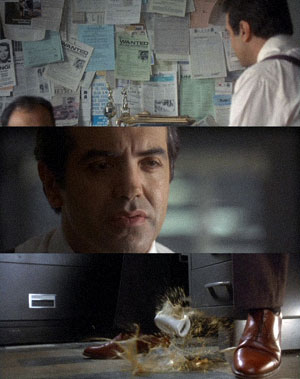 All of the hints that have been staring him in the face have started to surface and the mug is the final straw.
All of the hints that have been staring him in the face have started to surface and the mug is the final straw.
It falls slowly and the inevitability of it breaking reflects the penny dropping for Kujan – in a fairly literal sense – and also the premise of the Verbal’s story shattering. If we can’t even trust the mugs – where the name Kobayashi came from – then what can we trust? Certainly not Verbal.
We then cut to Verbal’s transformative walk; focusing only on his feet. His disability fades and his walk turns into a stride, then his hand straightens out. It all comes together to destroy the last hour and a half of plotline and dialogue, all with the simple change in walking.
Where are we left? We know the names of the criminals in the gang – that much is true – but everything else could just as well have been completely fabricated. To approach it from a post-structuralism perspective, the entire story has just collapsed on itself.
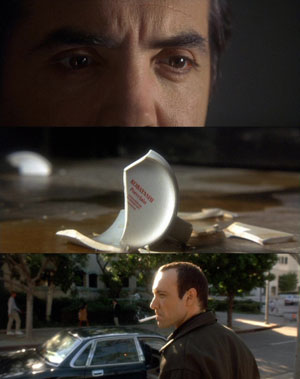
Taking this often mistranslated quote into account, there is nothing outside of the story (the text), we only have Verbal’s story to trust – and because the story itself is unstable, there is no truth here whatsoever.
The construction of a logical framework within Verbal’s story has been torn down by this single scene; there’s no truth because all reference points to reality have been completely eradicated. We, the viewer, can only pick up the pieces.
Verbal has the last words of the film which resonate with this breakdown of reality:
- Derrida, Jacques trans. Spivak, Gayatri Chakravorty (1998), Of Grammatology, The Johns Hopkins University Press; Corrected Edition edition ¹
As an ending this is incredibly frustrating, but it’s so rewarding for the next viewing. There are no conclusions or and certainly no closure, just more questions. In answering the question of who is Keyser Söze, there are far more questions about Verbal.
The Usual Suspects offers an open ending to an unreliable story, and nothing more. The final question is what do we make of the rest of the film once this happens?

Jack Murphy
Jack is an English Literature student in his early Twenties (The Golden Age!) at the University of Leeds. He insists on saying that he’s originally from Slough, Berkshire which is the setting of Ricky Gervais’ comedy series The Office – and not a day goes by that he’s not reminded of that fact… Irrespective of being mocked for it, Jack still is, and will most likely remain, a big Gervais fan.
And he sure knows how to spend his time. Having subscribed to a well known DVD delivery service for the past three years, Jack spends half of his days watching DVDs – and the other half on catch-up websites watching TV programmes.
© 2022 STATIC MASS EMPORIUM . All Rights Reserved. Powered by METATEMPUS | creative.timeless.personal. | DISCLAIMER, TERMS & CONDITIONS
HOME | ABOUT | CONTACT | TWITTER | GOOGLE+ | FACEBOOK | TUMBLR | YOUTUBE | RSS FEED
CINEMA REVIEWS | BLU-RAY & DVD | THE EMPORIUM | DOCUMENTARIES | WORLD CINEMA | CULT MOVIES | INDIAN CINEMA | EARLY CINEMA
MOVIE CLASSICS | DECONSTRUCTING CINEMA | SOUNDTRACKS | INTERVIEWS | THE DIRECTOR’S CHAIR | JAPANESE CINEMA





